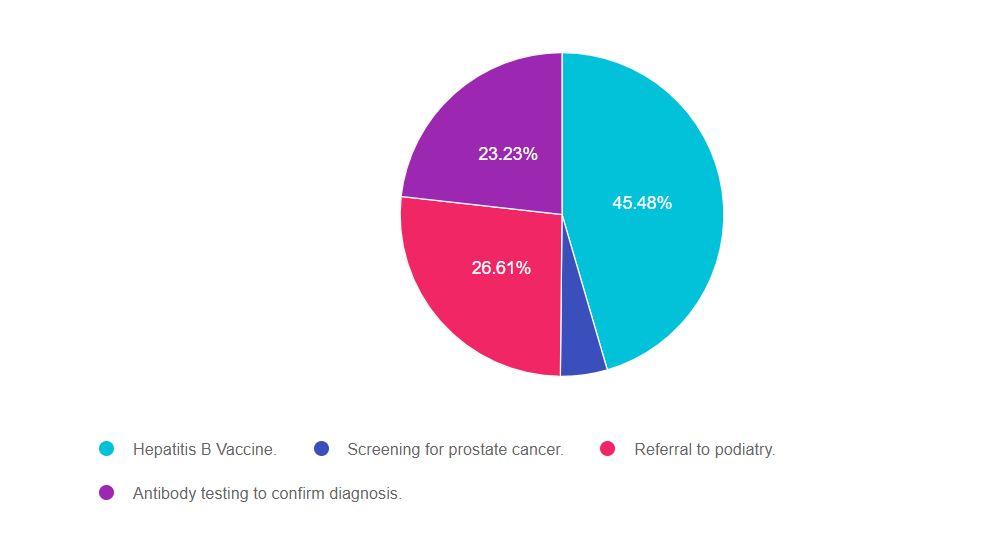
For our June 1st Question of the Week, only 45% of respondents chose the best answer. We want to “take a closer look” at this question and figure out how to drill down to discover the best response.
Before we start though, if you don’t want any spoilers and haven’t tried the question yet, you can answer below: Answer Question
Question: JR is 43 years old with newly discovered type 2 diabetes.
According to the ADA Standards, which of the following actions need to be taken with a new type 2 diabetes diagnosis?
Answer Choices:
- Hepatitis B Vaccine.
- Screening for prostate cancer.
- Referral to podiatry.
- Antibody testing to confirm the diagnosis.

As shown above, the most common choice was option 1, the second most common answer was option 3, then option 4, and finally option 2.
Getting to the Best Answer
If you are thinking about taking the certification exam, the content of this practice test question will set you up for success. The exam will present questions that require test takers to be familiar with preventive care measures, especially suggested vaccinations based on age and risk profile.
Answers & Rationale
Answer 1 is correct, 45.48% chose this answer, “Hepatitis B Vaccine.” CONGRATS, this is the BEST answer. According to the ADA Standards of Care (see below), people with diabetes who are 18-59 years of age need protection against hepatitis infection. Since people with diabetes may share glucose checking devices and may have less hearty immune systems, they are at higher risk of getting Hepatitis B. Getting the 2-3 dose series if not previously vaccinated, offers important protection.
Answer 2 is incorrect, 4.68% of you chose this answer, “Screening for prostate cancer.” According to the ADA Standards, a new diagnosis of type 2 diabetes does not require screening for prostate cancer. In addition, according to the consensus statement on Diabetes and Cancer, men with diabetes are not at higher risk of prostate cancer. However, people with diabetes are at higher risk of pancreas, liver and breast cancer, so regular screenings for these types of cancers is indicated.
Answer 3 is incorrect, 26.61% of you chose this answer, “Referral to podiatry.” This is answer is juicy, but we don’t have enough details in the question to support referral to a podiatrist. Not everyone with new diabetes is referred to podiatry for lower extremity care. Podiatry referral is based on a careful lower extremity assessment coupled with an indication that this person is at higher risk of complications (ie ulcerations, severe calluses, risk of injury when cutting toenails, loss of protective sensation, etc).
Answer 4 is incorrect, 23.23% of you chose this answer, “Antibody testing to confirm the diagnosis.” Another juicy answer. For most people with new type 2 diabetes, the clinical presentation coupled with family history and ketone status is usually enough to determine the type of diabetes. If the question hinted that this person might have type 1 (ie history of celiac or thyroid disease, positive ketones, BMI of 21 etc) then, the provider may want to evaluate for the presence of antibodies.
We hope you appreciate this week’s rationale! Thank you so much for taking the time to answer our Question of the Week and participate in this fun learning activity!
Sign up for Diabetes Blog Bytes – we post one daily Blog Byte from Monday to Friday. And of course, Tuesday is our Question of the Week. It’s Informative and FREE! Sign up below!
[yikes-mailchimp form=”1″]Accreditation: Diabetes Education Services is an approved provider by the California Board of Registered Nursing, Provider 12640, and Commission on Dietetic Registration (CDR), Provider DI002. Since these programs are approved by the CDR it satisfies the CE requirements for the CDCES regardless of your profession.*
The use of DES products does not guarantee the successful passage of the CDCES exam. CBDCE does not endorse any preparatory or review materials for the CDCES exam, except for those published by CBDCE.









